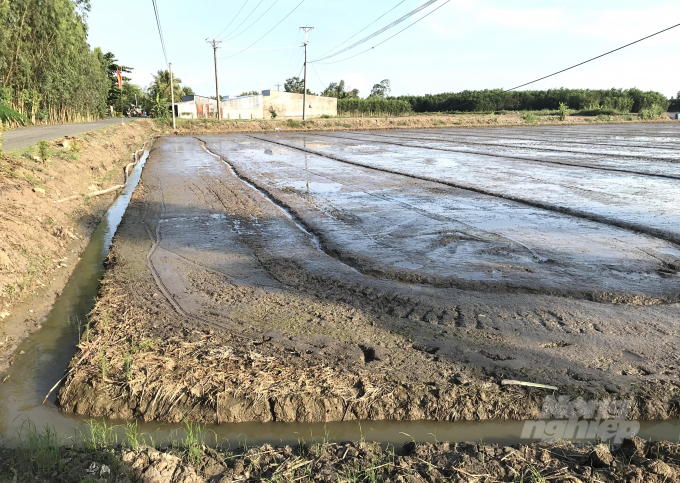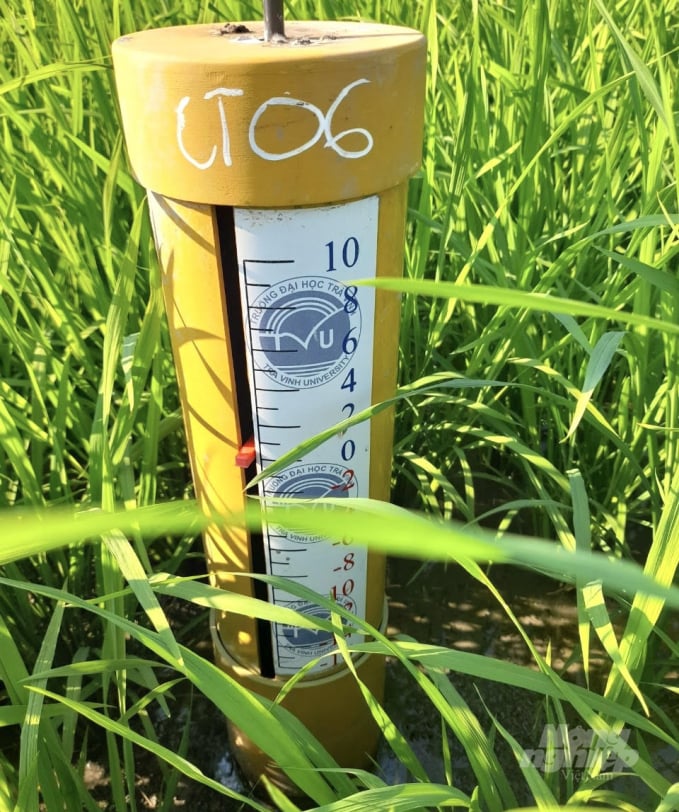May 16, 2025 | 09:50 GMT +7
May 16, 2025 | 09:50 GMT +7
Hotline: 0913.378.918
May 16, 2025 | 09:50 GMT +7
Hotline: 0913.378.918

A projected area where farmers cultivate rice by digging water drains and applying a water-saving method in the field. Photo: Huu Duc.
Rice-growing in many areas of the Mekong Delta is facing great challenges due to climate change and extreme weather. In the dry season of recent years, flows from upstream have decreased due to the water regulation from upstream hydropower dams on the Mekong River, causing an increasing shortage of freshwater for lower regions. Meanwhile, the saline intrusion is penetrating deeply into the hinterland. Rice cultivation and many crops have become very hard. To cope with that, a new technique of watering recognized as an economical way has been developed to be suitable for saving most water for the field. The new technic is a needed solution for farmers to pump and irrigate just enough, without surplus or shortage, to meet the water inquires at each stage of rice cultivation.
In the past 5 years, farmers in the VnSAT project area (Project for Sustainable Agricultural Transformation in Vietnam) in Soc Trang province have widely applied a new technique – the “wet, flooded and dry alternately” irrigation method to over 40,000ha of rice. This method is quite simple, easy, and does not cost much so any farmer can apply it to his or her own field.
Mr. Vo Quoc Trung, agriculture extension officer in Soc Trang province, who monitors and supports the technical training of the province's VnSAT project, explains: “Farmers who want to apply new method have to level their field at below 2cm. This aims to keep the water level just 5cm above the field surface so that the rice can grow and the weeds can be controlled.”
Basic techniques in rice farming under the irrigation method of “wet and dry alternately" should be applied in different periods of growth. The rice fields should be kept dry 1 day before sowing, 35-40 days after sowing, and 7-12 days before harvest. In other periods, water should be kept in the field at levels from 3-5cm, or it can go in and out of the field naturally according to the tide in areas with favorable conditions. This will help use water resources economically and efficiently, reducing the rate of damage for the rice plants.
Farmers outside the project area have also learned about this method. Through the VnSAT project, Soc Trang Agricultural Extension Center is disseminating, transferring, and replicating the techniques to rice farmers in the province.
Technical solutions "1 must 5 reduce" has been recognized by the Ministry of Agriculture and Rural Development. Mr. Nguyen Ngoc Huan, Director of Khiet Tam Cooperative in Vinh Thanh district, Can Tho city said: “Thanks to the VnSAT project, many farmers who are members of the cooperative have known and prefer to use a simple way to measure the water level just enough to supply rice.”
The advantage of the economical irrigation method for rice plants is that it has helped reduce the irrigation cost by 50%. The rice is stronger, less damaged, and less attacked by pests.

Farmers in Khiet Tam Cooperative install plastic pipes with floats to measure and delineate the water level on the rice fields. Photo: Huu Duc.
At present, farmers in some localities in the Mekong Delta who are applying this method, say that they recognize the benefits of this method as it has helped reduce the pumping costs thus bringing in obvious efficiencies for rice cultivation. It is easy to apply in winter-spring and summer-autumn rice crops because the rainfall is not heavy. However, in the autumn-winter crop is difficult as it often rains from June to September every year, making it difficult to work on low-lying fields.
According to the VnSAT project officials’ technical recommendation, to implement advanced rice farming solutions, conditions should be provided to ensure the application of mechanization in all farming stages, including the use of land tilling machines in plowing, harrowing, tilling, shafting, leveling the field surface and grooving with dimensions following to the guiding technical standards.
Machines or tools should be used in sowing and transplanting while personal water pumps or centralized water pumping stations for irrigation should be mobilized. Pesticide spraying machines or remote control spraying drones should also be used. Harvesters should be deployed during the harvest and vehicles or motorboats should be promoted for transportation after harvest as they will help reduce costs and losses for the whole harvest period.
Translated by Linh Nguyen

(VAN) Cold-barn systems efficiently manage environmental and temperature conditions, which aids in the prevention of respiratory diseases in pigs and protects them from the vectors that transmit African swine fevers.

(VAN) To tackle challenges, the project 'Addressing key technical bottlenecks in the grouper supply chain in Vietnam' has been underway since 2024.

(VAN) The project 'Disease-Resilient and Sustainable Cassava Production Systems in the Mekong Region', funded by the Australian Center for International Agricultural Research (ACIAR), is being implemented from 2024 to 2028.

(VAN) Data from 10,000 farming households will help professionalize production organization and support the implementation of the One Million Hectares Program for High-Quality, Low-Emission Rice Cultivation.

(VAN) FAO Director-General QU Dongyu marks International Day of Plant Health at NENA conference.

(VAN) Deputy Minister of Agriculture and Environment Hoang Trung affirmed that floriculture and ornamental plants are a growing industry that receives significant global attention.

(VAN) The three staple crops dominating modern diets – corn, rice and wheat – are familiar to Americans. However, fourth place is held by a dark horse: cassava.